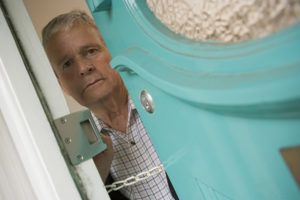May 14, 2019

Dementia wandering occurs for a variety of reasons, and can be helped through several key strategies.
Of the many results of Alzheimer’s disease, one of the most alarming is the person’s propensity for wandering, together with potential dangers that could possibly occur if the senior becomes confused or lost. Wandering can take place any time the senior is:
- Scared, confused or overwhelmed
- Searching for someone or something
- Bored
- Attempting to preserve a familiar former routine (for example, going to work or shopping)
- Tending to a basic necessity (such as getting a drink of water or going to the bathroom)
The aim is twofold; to help keep the senior safe, as well as to ensure his or her needs are fulfilled to attempt to stop the need to wander to begin with. Continuum Care, experts in at-home care in St. Charles and surrounding areas, offers these basic safety precautions if your loved one struggles with dementia wandering:
- Be sure that the house is equipped with a security system and locks that the individual is unable to master, such as a sliding bolt lock out of his / her range of vision. Many different alarms can be purchased, from something as simple as placing a bell over door knobs, to highly-sensitive pressure mats that will sound an alarm when stepped on, to GPS devices that may be worn, and many more. It’s also a good idea to register for the Alzheimer’s Association’s Safe Return Program.
- Camouflage exits by covering up doors with curtains, setting folding barriers strategically around doorways, or by wallpapering or painting doors to match the surrounding walls. You may want to try placing “NO EXIT” signs on doors, which can sometimes deter those who are in the earlier stages of dementia from attempting to exit.
- An additional risk for individuals who experience dementia wandering is the increased risk of falling. Go through each room of the home and fix any tripping concerns, such as eliminating throw rugs, electrical cords, and any obstacles which may be blocking walkways, adding extra lighting, and placing gates at the top and bottom of stairways.
It’s important to bear in mind that with guidance and direction, wandering is not necessarily a challenge. Take a walk together outside if weather permits and the senior is in the state of mind to be mobile, providing the added benefit of fresh air, physical exercise, and quality time together.
Although often challenging to manage, the dementia care team at Continuum is specially trained to be equally watchful and proactive in deterring dementia wandering and to incorporate creative techniques to help seniors with Alzheimer’s disease stay calm and content. Contact us at (314) 863-9912 to find out more about our private home care in St. Louis, MO and nearby areas!
